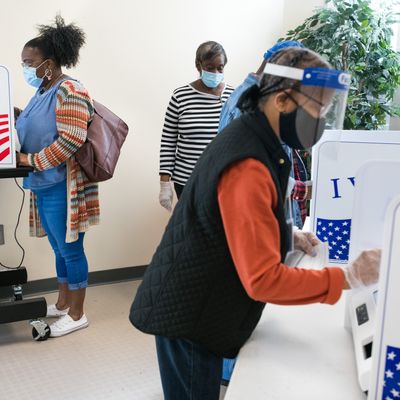
When the House passed the For the People Act, a package of voting, redistricting, and campaign-finance reforms, in March of 2019, it was a symbolic and aspirational effort. It passed on a strict party-line vote. Its significance as a Democratic “messaging” vehicle was reflected in its designation as HR 1, the first bill introduced in the 116th Congress.
The bill is back as HR 1 in the 117th Congress, but this time it will also be the first bill introduced when Democrats take over the Senate this week. The Republican majority in the Senate over the past four years made democracy-reform legislation a nonstarter. But now a Democratic governing trifecta in Washington gives such reforms a new impetus, as does the baleful experience of the 2020 election cycle, in which Republicans aligned with the Trump administration doubled down on a strategy of suppressing as many votes as possible and then trying to keep votes already cast from being counted or reflected in the final Electoral College balloting for the presidency.
Here’s a list of reforms in the legislation, as compiled by Daily Kos’s Stephen Wolf when it passed the House last year:
* Automatic voter registration at an array of state agencies
* Same-day voter registration
* Online voter registration
* Allowing 16- and 17-year-olds to pre-register so they’ll be on the rolls when they turn 18
* Allowing state colleges and universities to serve as registration agencies
* Banning states from purging eligible voters’ registration simply for infrequent voting
* Two weeks of in-person early voting, including availability on Sundays and outside of normal business hours
* Standardized hours within states for opening and closing polling places on Election Day, with exceptions to let cities set longer hours in municipal races
* Prepaid postage on mail ballots
* Allowing voters to turn in their mail ballot in person if they choose
* Requiring states to establish nonpartisan redistricting commissions for congressional redistricting
* Ending prison gerrymandering by counting prisoners at their last address (rather than where they’re incarcerated) for the purposes of redistricting
* Ending felony disenfranchisement for those on parole, probation, or post-sentence, and requiring such citizens to be supplied with registration forms and informed their voting rights have been restored
* Expressing support for D.C. statehood (which is the subject of a separate bill)
* Public financing for House campaigns in the form of matching small donations at a six-for-one rate
* Expanded campaign finance disclosure requirements to mitigate Citizens United
* Banning corporations from spending on campaign purposes unless
the corporation has established a process for determining the
political will of its shareholders
* Making it a crime to mislead voters with the intention of preventing them from voting
That’s a lot of reforms, and many are at cross-purposes with the GOP’s renewed determination to make voting more, not less, difficult — especially via mail balloting — and the latter-day Republican conviction that massive spending on elections by wealthy interests is not a travesty but a cherished First Amendment right.
So unless Republicans experience some sort of radical post-Trump conversion to enthusiasm for democracy, passage of these reforms in the Senate will almost certainly be blocked by its GOP minority, barring filibuster reform (which in turn would require unanimous Democratic support, which it does not appear to have at the moment). This also isn’t the kind of legislation that can be moved around the filibuster barricades by a budget reconciliation bill, because it doesn’t involve significant fiscal issues.
So long as democracy-reform legislation remains primarily significant, its proponents will likely package it with related measures, notably a restoration of the Voting Rights Act enforcement provisions that the U.S. Supreme Court effectively killed in 2013 as outdated (a simple statutory fix would make the same provisions evergreen), and (as noted above) statehood recognition for the District of Columbia. All these items cleared the House in the last Congress, and will now at least see the light of day in the Senate. Like the comprehensive immigration-reform bill Team Biden has signaled the 46th president will unveil as early as Inauguration Day, democracy reform will soon take a back seat to such immediate and achievable goals as confirmation of Biden administration appointees, a COVID-19 relief and stimulus package (a.k.a. the American Rescue Plan), and the many provisions that can actually be enacted as part of budget reconciliation.
But Democrats have set down an important marker with the For the People Act and the parallel reforms, and will constantly seek to expose the authoritarian tendencies in the GOP that have led it to abandon a once-strong bipartisan tradition of support for voting rights and other “good government” practices. The end of the Trump administration may force Republicans to decide once again whether they want to seek power through or in spite of popular support.






























